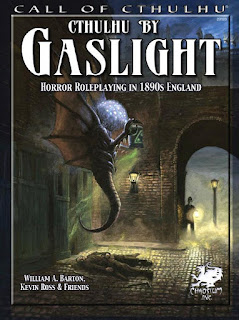 Game write-ups make for notoriously bad fiction. It’s not that surprising. “What happened in last night’s game?” someone asks, and we’ll trot out a great wodge of incident. But a story is much more than incident, as the Master reminds us. Incident – that is to say, the plot – is just the foundation. On that a storyteller builds the real narrative, which is a personal journey of change. Fighting a shoggoth has to mean something. You know this; you’ve seen “The Body”.
Game write-ups make for notoriously bad fiction. It’s not that surprising. “What happened in last night’s game?” someone asks, and we’ll trot out a great wodge of incident. But a story is much more than incident, as the Master reminds us. Incident – that is to say, the plot – is just the foundation. On that a storyteller builds the real narrative, which is a personal journey of change. Fighting a shoggoth has to mean something. You know this; you’ve seen “The Body”.
The best games would anyway make the worst stories. Fiction is designed to have endings that are “surprising yet inevitable”. We know Luke has to hit the thermal exhaust shaft, we just don’t know how he’s going to hit it. But we don’t want games to be inevitable, we want them to be like a second life. And our lives, engrossing as they are to us, don’t have the neat symmetries and moral and thematic patterns to be found in a work of fiction. The only way to achieve that effect in a game is if the referee (“games master” to me evokes a low-wattage sadist in a rugger shirt) twists events to come out the way he or she wants them to – which is the antithesis of good roleplaying. Not only must it be possible for defeats to occur, but they might be pointless. Shit must be able to happen - as, in our play-through of this adventure, it most definitely did.
All that aside, background incident is a useful resource to a writer. A lot of creative writing graduates could do with more of it. So in theory it should be possible to grow a good work of fiction out of a roleplaying game. Raymond E Feist infamously based a lot of his early novels on Tekumel campaigns. Still, we were talking about good fiction… I have been pestering Paul Gilham to turn his blisteringly brilliant Ghosts of London campaign into a novel. Paul demurs because I’m sure he realizes that all that meticulous plotting, vital though it is, is only the start. He’d need to break it all apart, insert a character with a need to change, and let us see the succession of plot events as the conduit for that change.
I did none of that with this write-up for our current 1890 campaign run by Tim Savin. It’s just the bare events of the game, albeit in the voice of my character. But it might be of interest because it’s based on a published scenario (“The Night of the Jackals” from Cthulhu By Gaslight 3rd edition) and because it gives a glimpse of our own games, which some of this blog’s readers have enquired about. Tally ho.



